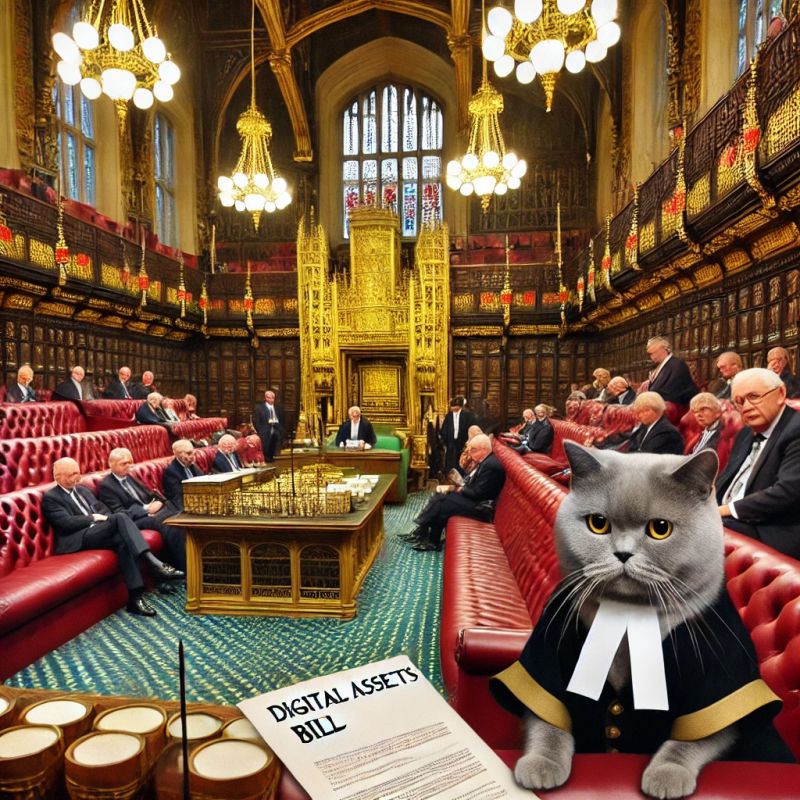
Latest in the D’Aloia Case
Learn more
January 11, 2024
Last Updated: March 12, 2024

As I write this, crypto is in the middle of a pump. Bitcoin is back nudging the $45k mark.
We are all going to make it.
Except, ultimately, none of us will. We all shuffle off (sorry if this is news to you).
As such, whether you’ve spent your life working in a 9-5 job, building a family empire, or trading memecoins like a degen, you will need to think about your estate planning position.
Now, one of the things that introduced a tax nerd like myself to crypto was not the dream of digital streets paved with digital gold, but the intellectual aspect. It was a brand new asset.
How does it scrub up for legal purposes? Only then can we properly think about the tax
For the classically trained lawyer, personal property can only be one of two things:
Clearly, crypto is not a tangible assets. It cannot be physically possessed (go on, try and hold some Dogecoin). So this does not fit neatly in this category.
Now, a scenario where one will have a right of action in this context is where one holds assets on a centralized exchange. For example, if I hold some bitcoin on Coinbase. Despite this being an anathema to crypto purists (‘not your key, not your crypto), this is the most popular form of ownership.
But where the assets are held via a private key, then the crypto holder has no right of action against any person.
However, over the last few years, a growing body of international case law has evolved confirming that cryptoassets can be ‘things’ if one takes a dynamic view of the common law.
Indeed, this is one of the great things about our common law system (brings a tear to your eye).
The recent final report published by the Law Commission has finessed this approach and suggested a new category pithily entitled ‘third category things’ (it had earlier called these ‘data objects’)
The Law Commission outlines three “indicia” defining third category things:
Cryptoassets will usually satisfy these indicias through their technological makeup, their independent existence, and inherent rivalrous nature.
So where was I?
Yes, the fact that cryptoassets are personal property for legal purposes has a number of implications. Two are directly relevant to this article:
What are the practical issues?
However, a significant issue with crypto is what preparations a crypto enthusiast should take in preparation for their demise. This asset class really raises some issues when it comes to estate planning.
There are regular reports of account holders who have died without making
Indeed, an article in the Crypto Times (“The Article”), which was also featured in the Telegraph, suggested that the UK is unfairly imposing Inheritance Tax (IHT) on crypto enthusiast’s estates on death despite private keys being lost:
Surprisingly, the UK government is imposing substantial taxes on the estates of deceased crypto traders, adding a financial burden to grieving families.
Now, I don’t believe this could possibly be the case for reasons I will set out below. However, it raises a very real problem when it comes to succession and cryptoassets.
How does one strike the right balance between security and planning?
Of course, and perhaps stating the obvious, if we’re embarking on an estate planning exercise in relation to cryptoassets we need to undertake a stock take of cryptoassets owned by the subject of the plan:
Of course, each of these would benefit from further elaboration. However, I have kept it short and sweet.
It should be noted that an inventory of cryptoassets like this may well be out of date before the Excel print out has had chance to cool off. This is because the make-up of the portfolios of active crypto participants can, and will, change very quickly.
However, this is the best we can do in this scenario until, perhaps, technology can fill in the gaps for us. More on this below.
First and foremost, it is suggested that the above list should never include the any data related to the private key.
However, even so, the details of the cryptoassets in the list above will still be sensitive. For example, if a criminal has access to this information, then they might take steps to get the individual to turn over the private key or suffer reprisals (I know, I am a cheerful soul!) As such, the asset list should not include details such as the name and address of the individual.
The list should not be attached to the will itself. The will should, of course, reference it. But the list of assets should not be included in the will and should not be stored with it.
The asset list should be kept safely – either on a secure server or in a safe to which the PRs / Executors can access post death and the private key data itself should be stored separately to the will and the list of assets.
But the estate planner should bear in mind the mindset of many crypto enthusiasts. This is because the purist might not want to write down what they own at all. In such circumstances, the executors will probably only appreciate what assets are held once they have been able to access and digest the assets linked to the private key.
Enough to tear your hair out, right?
It is also worth considering some of specific issues where the individual, at least whilst alive, controls the private key (via their wallet).
It is strongly suggested that custody of the private key is not handed over to the individual’s lawyer or accountant. As well as being a potential security issue for the client, it might also have significant implications for the adviser (for example, matters of insurance and potentially regulation).
OK, I have ruled out who shouldn’t be trusted with the private key. So, how else might we take care of the digital keys to the kingdom?
It should be pretty standard fare these days for professional advisers, in addition to drafting a will, that they also deal with LPAs.
An LPA is a legal document that allows you to appoint one or more people (known as Attorneys) to make decisions on your behalf if you lose the mental capacity to do so in the future, or if you no longer want to make decisions for yourself.
The need to consider an LPA is equally valid when it comes to our crypto chums.
However, the Attorneys will encounter similar issues to the PRs / Executors of an estate when it comes to management – particularly around private keys.
Racket from the crypto?
The Article I referred to above, regarding lost private keys and IHT, goes on to claim the following:
“The latest report in the community suggests that nearly $30.2 million in cryptocurrency becomes irrecoverable after their owner dies without sharing the details of the wallet’s private ey. Despite this, families of these dead crypto traders still have to pay potentially substantial tax bills.”
I really struggle to see how, in practice, estates are paying IHT on lost assets.
There are two reasons for this.
Firstly, it is difficult to see how anyone would go through the process of mapping out their assets to their executors and / or beneficiaries but make no provision for them to secure the assets post death. In other words, the executors are left with a valuation but no way of collecting the assets. It would seem that such a person wouldn’t have even set out what they owned.
But let’s say Mo has a portfolio of crypto tokens:
TAX coin held via private key and accessed through his Nano Ledger. They are valued at £1m
He has a TAX holding on Coinbase, after they listed this asset. This is worth £200k
Let’s deal with the assets connected to his private ledger.
Twelve hours prior to his death, Mo had an epiphany and prepared an accurate spreadsheet of his crypto-assets including up to date valuations. He printed this out and left it on his desk where it was found after his death.
Critically, he forgot to tell anyone where he stored his ledger and certainly hadn’t shared his seed phrase. He’d meant to check some of the new commercial solutions becoming available but, well, yer know. So, all he left behind was a list of what he owned.
How would we approach this unlikely scenario?
HMRC’s manuals have a significant chunk on loss of private keys for CGT purposes. This shows that HMRC understand the issue of a lost private key and how they are prepared to accept that the assets become worthless when they are irrecoverable through an event such as a lost private key.
This is necessary for CGT purposes because, if one wants to, say, use a loss, then you need to dispose of it – usually by sale or gift. However, if the private key is lost you cannot effect a disposal. So these provisions are necessary.
IHT on death is different.
Broadly speaking, forgetting reliefs and exemptions, one is taxed on the assets in which you were beneficially interested immediately prior to death.
Clearly, Mo had a beneficial interest in the assets immediately before death.
Further, it is this same date on which assets are valued. So, immediately prior to death, Mo could still control the assets, so the valuation is conducted on the basis he can still access the private key.
This sounds like a massive spanner in the works.
However, the IHT tax code is sharp as a tack on this. By virtue of IHTA 1984, s171, increases or decreases in the value of the property comprised in the deceased’s estate which have occurred by reason of the death shall be taken into account as if they had occurred before the death.
So, I think this provides us with the answer. Because Mo’s death means the assets have become irrecoverable (assuming that is the case) then, because the loss in value is as a result of his death, we can pretend the fall in value took place immediately before death.
The position is much more straightforward when it comes to the TAX coins held on Coinbase. Mo simply held a right of action against the platform rather than a proprietary right in the actual crypto.
As such, this right will pass on to the estate who will be able to enforce it. Of course, the estate may be totally unaware of the account (although Mo has provided a nice list).
In Mo’s case, his representatives are aware of his Coinbase account so will need to show that he has died and take control of the assets – in much the same way as a bank account or share trading portfolio.
As stated earlier on, cryptoassets will be personal property and therefore are assets within the estate. As such, the majority of planning techniques will remain the same as for other assets with perhaps some unusual nuances based on the idiosyncrasies of the technology.
As such, I simply point out some interesting(!) points that are peculiar to cryptoassets.
As we know, a UK domiciled individual will, in principle, be subject to IHT on his or her worldwide assets. A non-dom will be subject to UK assets only – until they become deemed domiciled in the UK. Nothing of note there.
However, the situs of cryptoassets is likely to be extremely relevant to a non-UK domiciled individual who will have an incentive for them to be non-UK situs.
I have previously written detailed articles on this subject, and dedicate an entire chapter to this in my book, so I will not labour the point again.
The position firstly depends on whether:
1. The asset is held by a centralized exchange; or
2. The asset is held by private key
It is bizarre that HMRC, in its guidance, makes no such distinction. Which perhaps further calls into question their manuals in respect of this topic.
In respect of the first, as a matter of law, the investor does not actually own the cryptoassets. They simply have a right of action against the exchange. This is the asset whose situs we must determine. The position is clear in that a right of action is situate where that right can be enforced. So, if the exchange is based in the Bahamas, it will be enforced in the Bahamas and its situs will be there.
The location of assets held by a ‘private key’ is more complex and controversial.
There are broadly, three main approaches:
The first, that the situs is based on the owners residence under SRT, is HMRC’s published view but this doesn’t have a great deal going for it (including it only deals with the position for individuals).
The second is that it is the owners residence under common law that is determinative. This is perhaps more workable, as it at least deals with corporate and trust ownership adequately.
The third approach to determining the location of cryptocurrency is to use the physical location of the private key. This approach has some attractions, but it also raises some challenges. However, I would expect this to continue to gain favour based on the Law Commission’s comments regarding how we define “possession” of third category things.
My own view is that, if one takes a differing view to HMRC’s published approach (even where it is likely to be wrong) one should make a white space disclosure on your relevant tax return.
As it is generally accepted by the Courts and practitioners that cryptoassets are personal property for the purposes of general law, then it is possible for cryptoassets to be subject to a trust.
Putting cryptoassets into trust has the benefit that it by-passes probate on the basis that the individual no longer is the legal owner of the assets at death.
Generally speaking, one would expect the trustees of the trust to delegate custody of the assets to a specialist custodian.
Of course, someone who is simply buying and selling tokens, and those activities do not amount to a trade, is not likely to need to think too hard about whether they qualify for BPR. They simply won’t.
However, there are areas where one might avail themselves of relief:
BPR, the analogy between crypto and other financial trades perhaps break down. This is because BPR is usually precluded based on the Dealing restriction in IHTA 1084, s105(3).
However, this relates to “securities, stocks and shares”. Strictly speaking, cryptoassets are unlikely to be any of these.
As such, where done properly, a trust can be an attractive and practical solution to some of the issues highlighted above.
Further, when it comes to non-domiciled individuals, there may be tax planning benefits of holding cryptoassets through non-UK structures. For instance, it should be eminently possible for cryptoassets to form excluded property for IHT purposes.
So, that brings us to the end of this rather morbid look at crypto. The nature of the asset is that, although it should be treated like any other asset, the technological features, and the mindset of some of the holders, might make this trickier than usual to deal with.
Hopefully, some of the issues will be remedied by technological advances – such as some of the tools set out above.
Until then, the specialist estate planner will really earn their Satoshi’s in this area. Because one thing’s for sure. Crypto enthusiast or not. We’re all going to make it…
…Even if just to the great rug-pull in the sky.
A second edition of Andy Wood’s book, Cryptocurrencies and other digital assets: Tax Law and Practice, will be published by Claritax Books in the new year

Andy has a breadth of experience as a Barrister and as a Chartered Tax Advisor, which means he comes into the crypto space with expertise he can't wait to share.
Learn more"*" indicates required fields
Want to join the community? View our range of packages with exclusive perks!
It’s not complicated. The best way to avoid bagholding is by staying informed. The best way of staying informed is by listening to the expert.
Andy has a wealth of experience and knowledge designed to help you navigate the crypto tax world, whether you’re in a bull run, sitting on uncomfortably large profits, or planning for the next halving.
Exclusive access
Exclusive access to one of the brightest minds in Crypto
Expert advice
Expert advice on preserving wealth, estate planning, wills, and so much more
International network
Connections to an international network of professional tax advisors

October 12th, 2024

September 12th, 2024

August 20th, 2024

August 2nd, 2024

June 17th, 2024

April 24th, 2024

April 4th, 2024

March 20th, 2024

March 20th, 2024

March 20th, 2024
Got a question or query about our community? Reach out now and we will get back to you soon.
"*" indicates required fields






